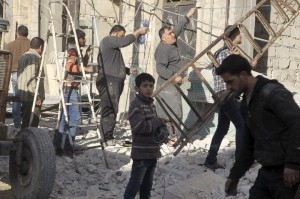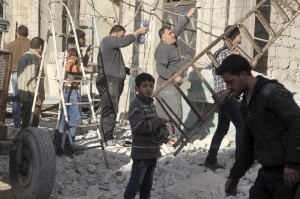Washington Post
David Ignatius
 Blaming President Obama for his past mistakes in Syria may be satisfying, and largely deserved, but it’s not a policy. This is the most complicated battlefield the world has seen in decades, and the next moves by the United States and its allies have to be deliberate and carefully considered.
Blaming President Obama for his past mistakes in Syria may be satisfying, and largely deserved, but it’s not a policy. This is the most complicated battlefield the world has seen in decades, and the next moves by the United States and its allies have to be deliberate and carefully considered.
The United States should move forward with the cease-fire process begun by Secretary of State John F. Kerry a week ago in Munich. Yes, it’s a long shot, and woefully dependent on Russian “goodwill.” But it offers a chance to reduce the suffering of the Syrian people and save lives, and it should be pursued a while longer. If diplomacy fails, what comes next will be much worse for everyone.
“It’s the only game in town,” says Yousef Al Otaiba, the United Arab Emirates’ ambassador to Washington, of Kerry’s diplomatic effort. “I don’t see any other strategy for now.”
If Russia is sabotaging cease-fire hopes by continuing to bomb Syrian civilians, then the United States and its allies should focus international indignation on Moscow. Yes, Kerry may have been overly optimistic in making the Munich deal, but the Russians signed it — and they should be held accountable if it fails.
In the Syrian nightmare, even small steps forward are notable. So this week’s move to send relief to five besieged areas around Damascus shouldn’t be dismissed. This humanitarian assistance was part of the Munich agreement, and U.S. officials say the aid convoys moved into some of the towns on Wednesday. It’s a fragile, first step toward de-escalation, but it’s a positive sign.
The “cessation of hostilities” that Kerry negotiated on paper was supposed to begin Friday, but it won’t. That’s partly because the Russians have continued their assaults on rebel areas. It’s also partly because the opposition hasn’t yet signaled clearly that it’s willing to stand down. Given the opposition’s weakness, this reluctance to embrace a truce is understandable, but it’s wrong. Any chance to reduce violence and create space for political discussion should be seized.
The battlefield around Aleppo is a mess — a crosshatch of different combatants and foreign forces. Within a small area are Syrian regime forces backed by Russia and Iran; Kurdish rebel forces backed by the United States; Turkish forces that are shelling the U.S.-backed Kurds; Arab rebel fighters supported by the CIA and Saudi intelligence; Jabhat al-Nusra fighters allied with al-Qaeda; and Islamic State fighters, who want to kill all of the above.
A full cease-fire in this landscape is impossible right now — and not just because Kerry has been too trusting of the Russians. The combatants have to sort themselves out. Rebels will vote with their feet whether to ally with Jabhat al-Nusra and the Islamic State. Saudi Arabia and other Arab patrons will have to lean hard on “moderate” rebels to pull them toward the cease-fire group and away from the terrorists.
If the Russians keep bombing the rebels around Aleppo willy-nilly, that will sabotage any hope of a truce. Here again, blame Moscow if it blocks de-escalation.
Going forward, the United States needs more military leverage to match Russia. That may be coming, with Saudi Arabia and the United Arab Emirates offering to send special forces into Syria, under overall U.S. command. Details are still being discussed, but the UAE appears willing to train Sunni fighters inside Syria — helping to fill a hole in U.S. strategy. These forces might be part of an eventual strike against Raqqa, the Islamic State’s self-proclaimed capital in eastern Syria.
The U.S. campaign against the Islamic State continues, mostly invisibly. The key U.S. allies have been fighters from the Syrian Kurdish group known as the YPG, which has now been rebranded as the “Syrian Democratic Forces.” This week, about 6,000 fighters moved to attack al-Shaddadi, a town about 50 miles east of Raqqa. This force included about 2,500 Arabs. Overall, the SDF umbrella group now numbers about 40,000, of whom 7,000 are Arabs. The Syrian Kurds have been the toughest and most effective fighters in this conflict. Their success seems to have panicked Turkey, which claims the Syrian Kurds are terrorists. The Turks have been shelling YPG positions in northwest Syria — even as these fighters (with quiet U.S. support) have been attacking Islamic State positions near Aleppo. What a crazy war — with a NATO member (Turkey) attacking America’s best allies in Syria (the Kurds)! The Syrian conflict is at a critical, delicate moment. A miscalculation by Russia or Turkey could be catastrophic. It’s never too late for the United States to do the right thing — which is to build, carefully, the political and military framework for a new Syria.



